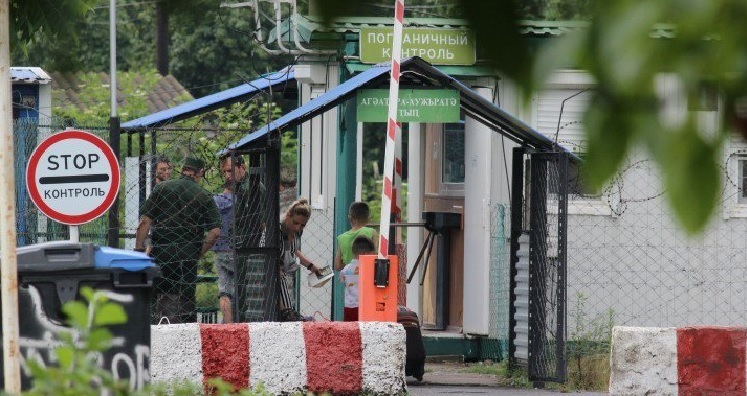Abkhazia’s closing of Enguri Bridge crossing-point with rest of Georgia to be raised at Geneva Int’l Discussions

As of today, Enguri Bridge is the only crossing-point connecting the occupied Abkhazia with the rest of Georgia. Photo: Erik Hoeg/Twitter
Georgian Foreign Minister David Zalkaliani said the issue of closing the occupation line between the Russian occupied region of Abkhazia and the rest of the country will be raised at the next round of the Geneva International Discussions on July 2-3.
We find this situation as unacceptable to us, the right to free movement is being restricted”, Minister Zalkaliani said while commenting on the recent restrictions imposed by the de facto leadership on the Enguri Bridge crossing-point amid recent protest rallies throughout Georgia.
De facto Abkhaizan leadership announced that the “entry of foreign citizens from the territory of Georgia, as well as the departure of citizens of the Republic of Abkhazia to the territory of Georgia” will be restricted for an undefined period of time.
The Georgian delegation will call on the Russian Federation to adopt a constructive approach and stop actions that restrict fundamental human rights and further aggravate the already difficult humanitarian situation on the ground”, Minister Zalkaliani said.
He further underscored that the Georgian side has already taken respective steps, activated the hotline and provided information to the Co-Chairs of the Geneva International Discussions and other partners.
We will call upon the Russian Federation within the framework of the next round of the Geneva International Discussions to act constructively and allow people to move freely, which they need, first of all, for humanitarian purposes. I refer to the fundamental right to freedom of movement”, Zalkaliani added
He also stressed that despite Russia’s actions, the Georgian Government continues to pursue unwaveringly its peaceful conflict resolution policy.
EU Special Representative for the South Caucasus and the crisis in Georgia Toivo Klaar expressed his deep concern over the recent restrictions on Enguri Bridge on his Twitter page.
Deeply concerned about restrictions at the crossing points along the Abkhaz ABL causing further difficulties for the conflict affected population. They need to be lifted to avoid additional humanitarian hardship. This will be an important item during next week’s #GID round.
— Toivo Klaar (@ToivoKlaar) June 28, 2019
The Head of EU Monitoring Mission Erik Hoeg also denounced the decision of de facto leadership.
#EUMMGeorgia deeply concerned about restrictions imposed yesterday at controlled crossing points at Abkhaz ABL. #EUMM patrols today confirm significant decrease of movement across ABL. Decision severely restricts freedom of movement & harms livelihoods of local residents. pic.twitter.com/xOAHJsycg7
— Erik Hoeg (@erik_hoeg) June 28, 2019
Minister of Foreign and European Affairs of Slovakia Miroslav Lajčák shared his concern as well.
Concerned by reports from #Georgia on closure of the Enguri crossing point. Such restrictions only lead to local populations suffering: Seeing people separated from their families & friends underscores the urgent need for #dialogue at the Geneva Int'l Discussions & elsewhere.
— Miroslav Lajčák (@MiroslavLajcak) June 28, 2019
The Georgian State Security said this temporary closure is an illegal restriction of the right of movement of locals, which isolates them and complicates their livelihoods.
Georgian Minister for Reconciliation and Civil Equality Ketevan Tsikhelashvili said the Georgian government is taking all measures the so-called border to be reopened as soon as possible.
The Head of Parliament’s Defence and Security Committee Irakli Sesiashvili believes that the decision of the de facto leadership is an example of Russia’s “soft power” and “political vandalism”.
 Tweet
Tweet  Share
Share